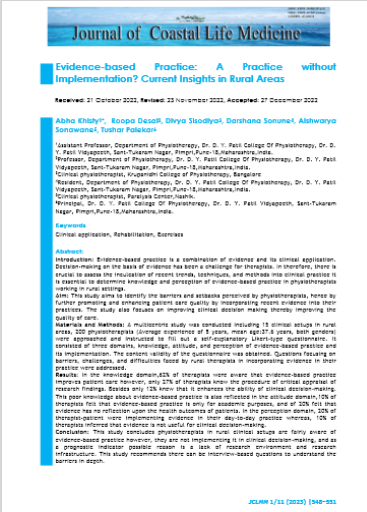Evidence-based Practice: A Practice without Implementation? Current Insights in Rural Areas
Main Article Content
Abstract
Introduction: Evidence-based practice is a combination of evidence and its clinical application. Decision-making on the basis of evidence has been a challenge for therapists. In therefore, there is crucial to assess the inculcation of recent trends, techniques, and methods into clinical practice it is essential to determine knowledge and perception of evidence-based practice in physiotherapists working in rural settings.
Aim: This study aims to identify the barriers and setbacks perceived by physiotherapists, hence by further promoting and enhancing patient care quality by incorporating recent evidence into their practices. The study also focuses on improving clinical decision making thereby improving the quality of care.
Materials and Methods: A multicentric study was conducted including 15 clinical setups in rural areas, 200 physiotherapists (Average experience of 5 years, mean age:37.6 years, both genders) were approached and instructed to fill out a self-explanatory Likert-type questionnaire. It consisted of three domains, knowledge, attitude, and perception of evidence-based practice and its implementation. The content validity of the questionnaire was obtained. Questions focusing on barriers, challenges, and difficulties faced by rural therapists in incorporating evidence in their practice were addressed.
Results: In the knowledge domain,62% of therapists were aware that evidence-based practice improves patient care however, only 27% of therapists know the procedure of critical appraisal of research findings. Besides only 12% knew that it enhances the ability of clinical decision-making. This poor knowledge about evidence-based practice is also reflected in the attitude domain,10% of therapists felt that evidence-based practice is only for academic purposes, and of 20% felt that evidence has no reflection upon the health outcomes of patients. In the perception domain, 20% of therapist-patient were implementing evidence in their day-to-day practice whereas, 10% of therapists inferred that evidence is not useful for clinical decision-making.
Conclusion: This study concludes physiotherapists in rural clinical setups are fairly aware of evidence-based practice however, they are not implementing it in clinical decision-making, and as a prognostic indicator possible reason is a lack of research environment and research infrastructure. This study recommends there can be interview-based questions to understand the barriers in depth.
Article Details
References
Alshehri MA, Alalawi A, Alhasan H, Stokes E. Physiotherapists’ behavior, attitudes, awareness, knowledge and barriers in relation to evidence-based practice implementation in Saudi Arabia: a cross-sectional study. International journal of evidence-based healthcare. 2017 Sep;15(3):127.
Barghouti F, Halaseh L, Said T, Mousa AH, Dabdoub A. Evidence-based medicine among Jordanian family physicians: awareness, attitude, and knowledge. Canadian Family Physician. 2009 Jul 1;55(7):e6-13.
Saunders H, Gallagher‐ Ford L, Kvist T, Vehviläinen‐ Julkunen K. Practicing healthcare professionals’ evidence‐ based practice competencies: An overview of systematic reviews. Worldviews on Evidence‐ Based Nursing. 2019 Jun;16(3):176-85.
Perraton L, Machotka Z, Grimmer K, et al. Embedding evidence-based practice education into a post-graduate physiotherapy program: eight years of pre-post course evaluations. Physiother Res Int 2016.
Piza F, Kesselheim JC, Perzhinsky J, Drowos J, Gillis R, Moscovici K, Danciu TE, Kosowska A, Gooding H. Awareness and usage of evidence-based learning strategies among health professions students and faculty. Medical teacher. 2019 Dec 2;41(12):1411-8. 28
McEvoy MP, Lewis LK, Luker J. Changes in physiotherapy students' knowledge and perceptions of EBP from first year to graduation: a mixed methods study. BMC Med Educ. 2018 May 11;18(1).
Wilson A, Howitt S, Holloway A, Williams AM, Higgins D. Factors affecting paramedicine students' learning about evidence-based practice: a phenomenographic study. BMC Med Educ. 2021 Jan 12;21(1)
Ateef M. Evidence-based learning and practice in physical therapy: A need for novice physical therapists. Saudi J Sports Med 2015;15:106-7
Silva TM, Costa L, Costa LO. Evidence-Based Practice: a survey regarding behaviour, knowledge, skills, resources, opinions and perceived barriers of Brazilian physical therapists from São Paulo state. Brazilian journal of physical therapy. 2015 Jul;19:294- 303.
AlKetbi H, Hegazy F, Alnaqbi A, Shousha T (2021) Evidence-based practice by physiotherapists in UAE: Investigating behaviour, attitudes, awareness, knowledge and barriers.
Abha Khisty, Seema Saini, Neha Chaudhary,SayaliDalvi,ToralDave,Deborah Baretto,”Knowledge,Attitude and Perception about Neurodevelopmental Disorder among Pregnant Women:A Cross-sectional study”,Journal of clinical and diagnostic research,2022.

